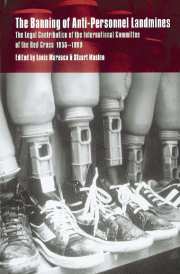 The Banning of Anti-Personnel Landmines
The Banning of Anti-Personnel Landmines Book contents
- Frontmatter
- Contents
- Foreword by Cornelio Sommaruga, President, International Committee of the Red Cross
- Foreword by Ambassador Jacob S. Selebi, South Africa
- Foreword by Ambassador Johan Molander, Sweden
- Introduction
- PART 1 FROM PRINCIPLES TO RULES: REGULATING MINES UP TO THE 1980 CONVENTION ON CERTAIN CONVENTIONAL WEAPONS
- PART 2 THE REVIEW CONFERENCE OF THE 1980 CONVENTION ON CERTAIN CONVENTIONAL WEAPONS: AN INITIAL RESPONSE TO THE LANDMINE CRISIS
- PART 3 THE OTTAWA PROCESS FROM REGIONAL INITIATIVES TO AN INTERNATIONAL PROHIBITION OF ANTI-PERSONNEL MINES
- Index
Foreword by Ambassador Jacob S. Selebi, South Africa
Published online by Cambridge University Press: 03 December 2009
- Frontmatter
- Contents
- Foreword by Cornelio Sommaruga, President, International Committee of the Red Cross
- Foreword by Ambassador Jacob S. Selebi, South Africa
- Foreword by Ambassador Johan Molander, Sweden
- Introduction
- PART 1 FROM PRINCIPLES TO RULES: REGULATING MINES UP TO THE 1980 CONVENTION ON CERTAIN CONVENTIONAL WEAPONS
- PART 2 THE REVIEW CONFERENCE OF THE 1980 CONVENTION ON CERTAIN CONVENTIONAL WEAPONS: AN INITIAL RESPONSE TO THE LANDMINE CRISIS
- PART 3 THE OTTAWA PROCESS FROM REGIONAL INITIATIVES TO AN INTERNATIONAL PROHIBITION OF ANTI-PERSONNEL MINES
- Index
Summary
Throughout the turbulent times of our recent history, the International Committee of the Red Cross has persistently and unstintingly focused the attention of the world on the devastation caused by war on innocent people and sought to strengthen the rules and principles of international humanitarian law, in order to save lives and alleviate suffering caused during and after armed conflict.
The ICRC was amongst the first campaigners to address the horrifying civilian casualties caused by anti-personnel mines long after conflicts have ended. On the African continent, which is particularly affected by this landmine scourge, these mines remain hidden to prey on those who venture out to seek firewood or to fetch water for the family, or dare to hunt or to plough the fields. These deadly killers lay to waste economic infrastructure and stifle socio-economic development.
Governments have for too long argued that anti-personnel mines are a necessary instrument of war. Nations have acquired large quantities of these mines in the misguided belief that such weapons will give them security.
The sustained efforts by the ICRC, amongst others, to raise awareness of the effect such mines have on civilians, prompted States to recognize that the right of parties to an armed conflict to choose methods of warfare is not unlimited. From this belief was born the Convention on Prohibitions or Restrictions on the Use of Certain Conventional Weapons Which May be Deemed to be Excessively Injurious or to Have Indiscriminate Effects (CCW).As an instrument of international humanitarian law, the objective of this Convention is to save lives and alleviate suffering during armed conflict.
- Type
- Chapter
- Information
- The Banning of Anti-Personnel LandminesThe Legal Contribution of the International Committee of the Red Cross 1955–1999, pp. xxi - xxiiPublisher: Cambridge University PressPrint publication year: 2000


